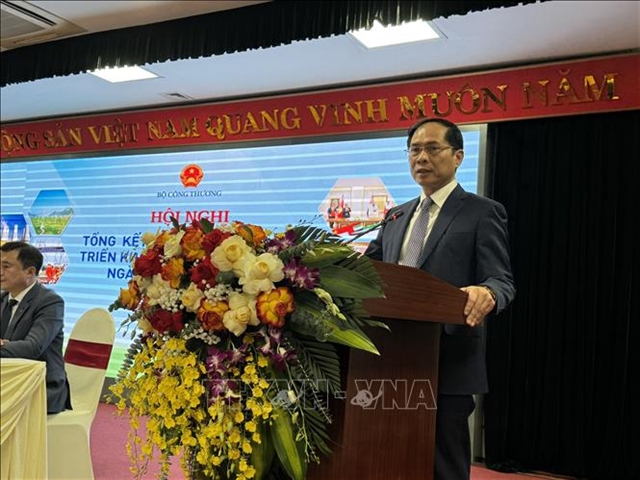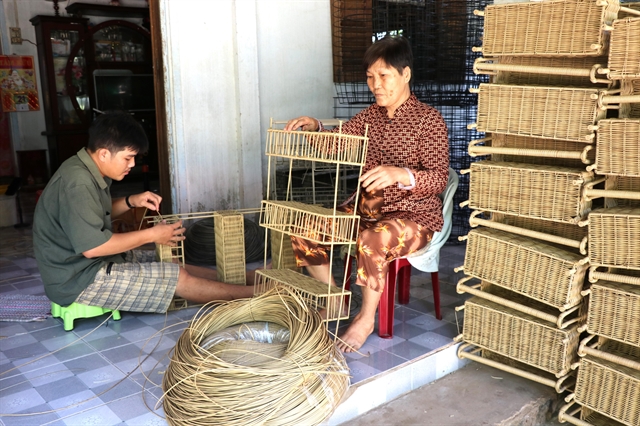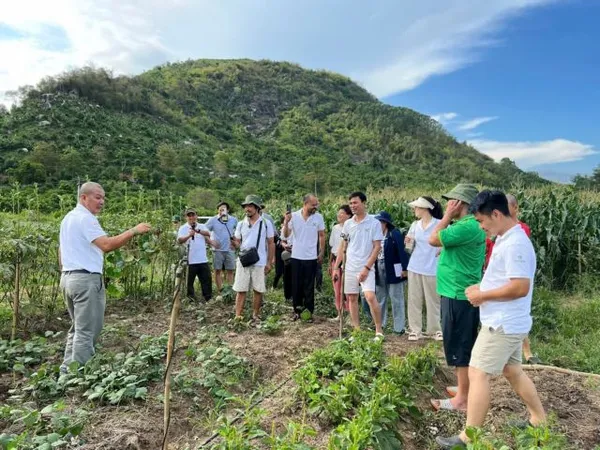 Economy
Economy


|
| Deputy Prime Minister and Minister of Foreign Affairs Bùi Thanh Sơn speaks at the event. VNA/VNS Photo |
HÀ NỘI — Taking a pioneering role, the industry and trade sector in 2025 must accelerate to implement and meet the country’s longer term development targets.
That was the message from Deputy Prime Minister and Minister of Foreign Affairs Bùi Thanh Sơn on the specifics of the five-year Socio-Economic Development Plan 2021-2025.
At a meeting to review the work in 2024 and deploy tasks in 2025 of the industry and trade sector on Monday, Sơn said 2025 would be very important, as it would be the year to consolidate the fundamental factors and create a premise for Việt Nam to confidently enter a new era, towards successfully implementing the goals of the 10-year Socio-Economic Development Strategy in 2021-2030.
“The country’s target of eight per cent GDP growth or higher in 2025 is a very high requirement. This requires great efforts from the entire political system, people and businesses, in which the industry and trade sector needs to affirm its pioneering role in this process,” Sơn noted.
In 2025, the Ministry of Industry and Trade (MoIT) targets industrial production index to increase by about 9-10 per cent compared to 2024; export of goods to increase by about 12 per cent, total revenue of retail sales of goods and consumer services to increase by about 10 per cent and total electricity production and import to increase by about 12.2 per cent to 347.5 billion kWh.
To meet the targets, Sơn raised a number of issues for the MoIT to study and implement in 2025 and the following years.
Firstly, to free up resources and attract investment, it is necessary to create a favourable, clear and transparent legal environment and remove barriers in administrative procedures for industrial production development and promote trade, according to the deputy PM.
Secondly, the ministry needs to promptly review, complete and submit to the Prime Minister for promulgation the Strategy for Industrial Development, in order to enhance the independent and self-reliant capacity of Việt Nam's production. The strategy must focus on developing industries that use a lot of technology, have high added value and low-carbon emission. It must issue incentive policies that are strong enough to develop priority areas of key industries such as metallurgy, mechanical engineering, electronics and semiconductor industries, energy industry ecosystem and supporting industries.
In addition, it is necessary to deploy solutions to ensure national energy security. Avoiding power shortages is a mandatory requirement.
The ministry must strengthen trade promotion, diversify markets and supply chains to create a breakthrough in expanding new potential export markets while consolidating and expanding market share in traditional markets.
In particular, it is necessary to promote the development of the domestic market to stimulate local consumption and trade.
The ministry must also closely monitor the domestic market situation to timely implement measures to ensure the balance of supply and demand of goods, especially during peak periods including the upcoming Tết holiday.
Minister of Industry and Trade Nguyễn Hồng Diên said in 2025, the industry and trade sector would focus on institutional development, considering it a breakthrough to create a synchronous and feasible legal corridor in order to promote investment attraction for industrial, energy and trade development.
“The ministry is completing legal regulations on guiding the implementation of the newly amended Electricity Law and the Government's decrees on incentive policies to develop the industrial sector, especially foundational industries and new types of energy,” Diên said.
“At the same time, the ministry is also completing the draft Law on Chemicals, the Law on Economical and Efficient Use of Energy, the Law on Production of Key Industrial Products and the Law on E-commerce Management to submit to the National Assembly for approval at the NA’s upcoming meetings,” he added.
In particular, the ministry would strengthen international economic integration, proactively advise on effectively exploiting opportunities from foreign relations with major countries to seize the wave of investment shifting in key industries to third countries by multinational corporations. It would closely connect FDI enterprises with domestic enterprises to contribute to improving the competitiveness of Vietnamese enterprises.
The ministry would continue to promote the role of Vietnamese trade offices abroad in supporting localities and enterprises to effectively exploit FTAs of which Việt Nam is a member.
According to Deputy Minister of Industry and Trade Phan Thị Thắng, the industry and trade sector has so far completed and exceeded all assigned targets and tasks set for 2024. — VNS




